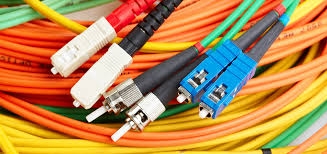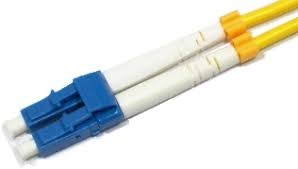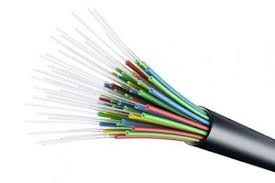Understanding LC APC and LC Stecker: Key Parts of Fiber Optic Cable Systems

Fiber optic cables are essential for modern communication, providing rapid and reliable data transmission over long distances. A crucial part of these systems is the connectors that join the fiber optic cables are a critical part of these systems. There are two important types of connectors: LC APC and LC Stecker. In this blog, we’ll break down what these connectors are, how they work, and why they are important in fiber optic systems.
What is an LC-APC connector?
Lucent Connector, also known as Angled Physical Contact (LC APC), is a popular connector in fiber optic systems due to its small size, reliability, and efficiency. The term "APC" in LC APC refers to the polishing of the connector's fiber end at an 8-degree angle. This angled design reduces the amount of light that reflects into the fiber, which can cause data loss or interference. Instead, it directs the light into the fiber's cladding, where it doesn't interfere with the signal.
What is an LC Stecker?
The LC Stecker is a German term for the LC Connector. Connectors such as the LC Stecker connect optical fibers in fiber optic systems, ensuring a stable and reliable connection. People widely use the LC Stecker due to its small size, ease of use, and high performance.

The LC Stecker uses a push-pull mechanism, which makes it simple to connect and disconnect. Settings such as testing environments, data centers, and telecommunications networks, where frequent cable plugging and unplugging is necessary, find this particularly useful. Because the LC Stecker is small, it allows for more connections in a small space, which is important for today’s high-capacity networks.
LC APC vs. LC UPC: What’s the Difference?
When discussing LC connectors, you may also come across references to LC UPC (Ultra Physical Contact) connectors. Here are the differences between LC APC and LC UPC:
- Polishing Style: LC APC connectors have an 8-degree angled end, while LC UPC connectors have a flat, straight end. The angled polish of LC APC connectors helps reduce light reflection, making them better for applications that need very low signal loss.
- Return Loss: LC APC connectors typically have lower return loss, meaning they keep the signal strong and clear, which is important for long-distance communication.
- Applications: High-performance applications like optical splitters and long-distance networks use LC APC connectors. Short-distance applications such as local area networks (LANs) and data centers often utilize LC UPC connectors.
Why choosing the right connector matters
Picking the right connector, whether it’s an LC APC or LC Stecker, is important for your fiber optic system’s performance. Here are some things to consider when choosing a connector:
- Performance Needs: If your setup requires minimal signal loss, such as in long-distance telecommunications, LC APC connectors are a suitable choice. For shorter distances or less critical applications, LC Stecker or LC UPC connectors might be sufficient.
- Space: In places where space is limited, such as data centers, the small size of LC connectors is a big advantage. The compact LC Stecker allows more connections in a small area, which is crucial for high-density networks.
- Ease of Use: LC connectors are designed to be easy to install and maintain. The push-pull design makes connecting and disconnecting simple, which is helpful in environments where cables are often reconfigured.
- Environment: If your system is in a harsh or outdoor environment, you might need connectors with better sealing and durability. Industrial-grade LC APC connectors, for example, are built to withstand tough conditions and still perform well.

Conclusion
Understanding LC APC and LC Stecker connectors is essential for anyone working with fiber optic cable systems. These connectors play a crucial role in ensuring that data is transmitted efficiently, with minimal signal loss.
The LC APC connector, with its angled design, is perfect for high-performance applications that require low return loss. Meanwhile, the LC Stecker, known for its small size and ease of use, is a versatile connector that works well in a variety of fiber optic systems.
By choosing the right connector for your needs, you can ensure your fiber optic network performs at its best, meeting the demands of modern communication and data transmission.
- Industry
- Art
- Causes
- Crafts
- Dance
- Drinks
- Film
- Fitness
- Food
- Games
- Gardening
- Health
- Home
- Literature
- Music
- Networking
- Other
- Party
- Religion
- Shopping
- Sports
- Theater
- Wellness
- News


